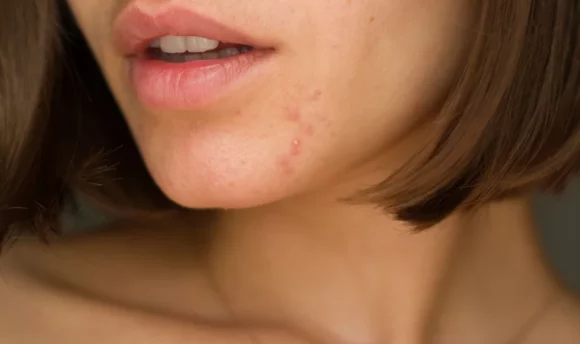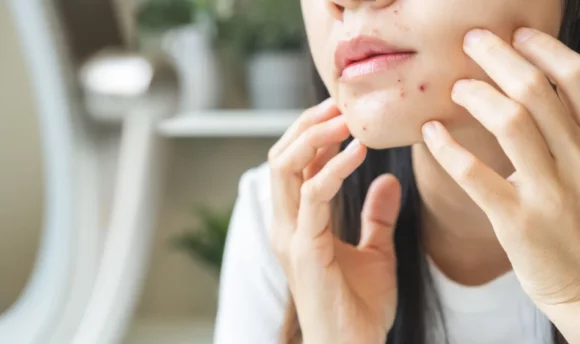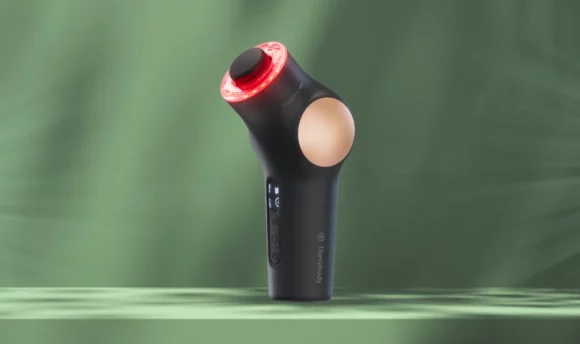Does Creatine Cause Acne? Replacing Myths With Facts
Creatine is a supplement often used to enhance muscle performance, but what are its effects on your skin? Explore the side effects of creatine and the potential link to acne.

So, you’ve started taking creatine to support your body goals, but you wake up one day to see a sudden acne breakout. As tempting as it might be to blame creatine, this supplement may not be the actual cause of your pimples.
Creatine is a safe dietary supplement that many people take to fuel their muscle growth and brain. It naturally resides in muscle cells, meaning it is not a man-made substance that could harm your body.
So, can creatine cause acne? Discover the link between these two factors, along with ways to treat and prevent stubborn pimples.
Does Creatine Cause Acne?
There is no evidence to suggest that taking creatine causes acne. Creatine is a safe supplement that shouldn’t cause any harm to your skin. However, there is a chance that this muscle-boosting powder could indirectly cause acne by increasing dehydration and blood pressure.
Anecdotal evidence from other people’s experiences may show a link between creatine and acne, but that doesn’t mean it’s completely true. Most of the time, acne stems from other common factors such as genetics, hormonal changes, stress, eating habits, and a poor skincare routine.
It’s possible that creatine supplements could influence other factors that link to acne. For example, research suggests that not drinking enough water while taking creatine will lead to dehydration. A lack of hydration means your body cannot flush out dead skin cells and bacteria efficiently, which fosters clogged pores.
To prevent acne breakouts and side effects when taking creatine supplements, always drink the recommended daily water intake. This is 9 cups for women and 12 cups for men, without any additional fruit concentrate.
What Is Creatine?
Creatine is an amino acid that your body naturally produces in the muscles. Many brands have created creatine supplements to support muscle growth and enhance your exercise performance. This substance works by energizing your muscles during heavy weight training.
Due to creatine being an essential protein, it can help grow, repair, and strengthen your muscles. The consistent supply of energy to every muscle will also stop you from becoming fatigued when exercising. Creatine can also be found in food sources such as red meat, seafood, and animal milk.
Your body produces creatine in your liver, kidneys, and pancreas. Any remaining amino acids will go to your brain and heart. It’s not essential to take creatine supplements, but it is beneficial if you want to lose fat and build muscle, have better energy levels, and lose weight.
Some people may take creatine supplements for other reasons. The top benefits include better concentration, lower blood sugar levels, reduced fatigue, and healthier skin.
Side effects of creatine
Learning about the side effects of creatine can help you determine whether this supplement is right for you. Side effects may occur for those who have existing health problems with their liver or gut, but they shouldn’t be common for the average person. Liquid creatine and capsule supplements may also affect your body differently, so keep that in mind.
Below are some potential side effects of creatine supplementation:
- Muscle cramps
- Diarrhea
- Bloating
- Dehydration
- Headaches
- Upset stomach
- Constipation
- High blood pressure
- Liver dysfunction
Creatine and Acne: Causes and Prevention Tips
It’s important to reiterate that creatine supplementation is safe, but it can have side effects if you don’t take care of your body. You should always follow the recommended dosage of creatine, which is usually around 5 grams. Alongside this, focus on your skincare routine and eating habits to limit sudden acne outbreaks.
Below are common causes of acne and ways to prevent it:
#1 Hydration
Staying hydrated is essential during creatine consumption. This is because creatine fills your muscles with stored water found in your gut or skin. Therefore, you must replace this water to prevent dehydration.
As mentioned before, 9–12 cups is the average amount without creatine, but you should ideally consume an additional 2–3 cups when taking the supplement. Drinking this amount ensures that creatine has enough water to fuel your muscles properly.
Remember that a high water intake will contribute to greater muscle mass and athletic performance. These are the two prominent benefits you will experience when consuming creatine.
Hydration also regulates sebum oil production – a natural oil your body produces to protect your skin. Too much of it can clog your pores and trigger acne, so it’s important to keep this under control with a consistent water intake.
#2 Personal hygiene
Personal hygiene means cleaning your face at least twice a day. Not doing this could increase the amount of bacteria and dirt that resides in your pores, which will cause acne. You can use a face wash, toner, serum, and moisturizer as part of your skincare routine or speak to a dermatologist about suitable products.
It’s important to note that personal hygiene doesn’t just apply to your face. It also includes washing your hands regularly to ensure you’re not transferring bacteria. The same goes for hair care – dry your hair as soon as you leave the shower. Sleeping in wet locks can create moisture, which increases the risk of fungal or bacterial infections on your skin.
Other ways to practice good hygiene include to:
- Wash your hair and body often to remove excess products
- Trim your nails to stop bacteria build-up underneath
- Regularly swap your pillowcase and bed sheets
- Apply antibacterial gel to your hands
- Try not to touch as many things outside
- Keep your clothes clean, including face masks
- Brush your teeth every day to stop bacteria from building up around your mouth
- Remove any makeup at the end of the day
#3 Creatine product quality
Creatine monohydrate is the best form of creatine you can take for your health. It is the most-researched supplement when it comes to increased muscle mass, better athletic performance, and fewer side effects.
You should only go for natural versions of creatine that have been made or approved by experts. To ensure the supplement is safe, check the ingredients label. There shouldn’t be any additives such as artificial flavoring, sugar, or ethyl. A high sugar intake can promote acne because it increases inflammation and stops your body from regulating good and bad bacteria.
Brands sometimes throw together ingredients that are useless or don’t work, such as caffeine and artificial flavoring. Caffeine amplifies dehydration, while artificial flavorings don’t provide any minerals or benefits.
So check the product’s quality, ingredients, and reputation before buying. If you’re still not sure, talk to a registered dietitian.
FAQs
Creatine can improve your skin when applied topically. This is because it helps to create new skin cells, which reduces hyperpigmentation and acne scars. It’s also believed that creatine boosts skin elasticity and dulls the appearance of wrinkles, fine lines, and age spots.
Taking a creatine supplement every day could increase your skin cell turnover and repair rate, meaning you’ll have more youthful skin over time. Creatine may also boost collagen – a type of protein that delays the onset of sagging skin as you age. It’s worth pairing creatine with a collagen supplement for healthy skin and hair growth.
You should stop taking creatine if you experience adverse side effects such as high blood pressure, liver dysfunction, and painful bloating. If you do suffer from acne breakouts, stop consuming creatine supplements to see whether the pimples clear on their own.
A Word From a Dermatologist
Those who are building muscle mass may consume creatine monohydrate to boost their long-term results. Creatine supplementation is safe, and it shouldn’t harm your skin. If anything, creatine should boost your skin’s health by increasing collagen production in your body.
However, acne can be challenging to deal with, especially if you experience those sudden breakouts after starting creatine. To overcome this skin condition, wash your face with gentle cleansers and use a soothing moisturizer to reduce inflammation. It’s also important not to touch your face, even when it’s tempting to pick a spot.
Ingredients such as benzoyl peroxide, salicylic acid, alpha hydroxy acid, adapalene, and glycolic acid all work best for treating acne. Research suggests that using salicylic acid cleansers can decrease any texture on your face and remove any acne-inducing bacteria.
If you are struggling with acne, stop creatine supplementation to see if that helps. You should also consult with your doctor to get a dermatology appointment, which will give you proper treatment.
Conclusion
Creatine supplementation has not been scientifically proven to cause acne. However, it may lead to dehydration if you don’t drink enough water, which stops your body from cleaning your pores. Taking creatine monohydrate to enhance your lean muscle mass, athletic performance, and skin health is perfectly safe.
For more guidance on treating and preventing acne while taking creatine supplements, speak to a professional dermatologist.

















































 Select your language:
Select your language: 








